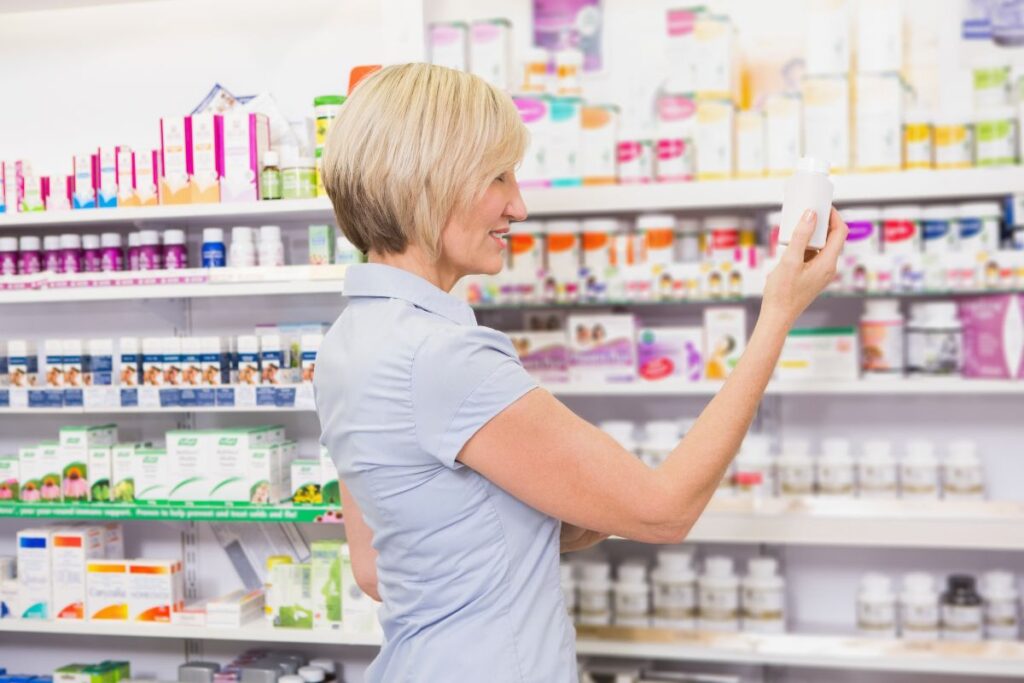If you’ve walked through the supplement aisle of your local grocer or drug store, you’ve probably seen several products marketed to women+ on the menopause journey. There are also a number of online providers offering products to women+. Navigating the labels and understanding the ingredients can be confusing. This guide to menopause supplements can help you make a choice, with your healthcare practitioner, on whether supplements will help you treat your menopause symptoms.
Disclaimer: The information provided in this blog is for educational purposes only and does not constitute medical advice. The author does not endorse or recommend the use of any specific supplements or treatments mentioned. It is important to consult with a healthcare provider before starting any new medication or supplement, as the necessity and appropriateness of such interventions can vary greatly from person to person. Some individuals may find relief from menopause symptoms through non-hormonal techniques and lifestyle changes.
Readers should also be aware that dietary supplements are not FDA-approved for the treatment or prevention of menopause symptoms and have not been evaluated for efficacy or safety. Use all supplements with caution and under the guidance of a qualified healthcare professional.
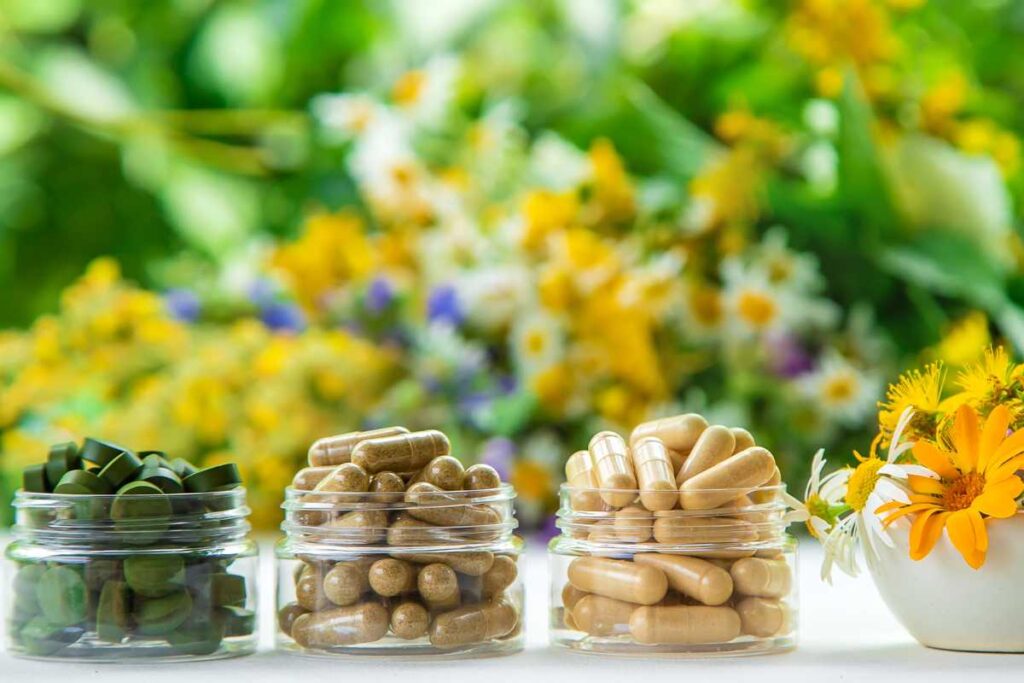
Menopause supplements
During the menopause journey, women+ have a number of options to treat symptoms. While hormone therapy (HT) is the recommended treatment by leading menopause and gynecological societies for those who don’t have medical contraindications, some women+ want to consider alternative options.
A growing number of women+ are turning toward non-hormonal options, including menopause supplements which may contain herbs and other ingredients.
These products are often advertised as:
- non-hormonal
- hormone-free
- plant-derived
- estrogen-free
- natural
Most are easy to find in your local drugstore.
Some of the supplements which have gained attention for their purported benefits for menopausal women+, include:
| Ingredients | Supplement Brand Names Containing Them |
|---|---|
| bioactive antioxidant supplement | Amberen® |
| S-equol | Equelle® |
| phytoestrogens like black cohosh, soy, fenugreek, flaxseed, hops, red clover, and rhubarb extract | Estroven®, Estrovera®, Femarelle® |
| bee pollen extract | Relizien®, Femal, Femalen, Sérélys® |
| chaste tree berry | Various |
| evening primrose oil | Various |
| diindolylmethane (DIM) adaptogens | Various |
| vitamin B | Various |
| vitamin E | Various |
Let’s explore each of these supplements and discuss their potential advantages.
Amberen®
If you look on the shelves of your local drug store, you may find Amberen®, a product marketed as helping with several perimenopausal symptoms.
This supplement contains succinates – certain antioxidants which are molecules in cells that help the brain and body communicate better. They help regulate hormone production.
Amberen® ingredients include a blend of bioactive succinates, amino acids, minerals, and vitamin E. It does not contain soy or estrogen.
The manufacturer has conducted several clinical trials. Learn more.
And the manufacturer reports women who took the menopausal product saw improvements in:
- Hot flashes
- Night sweats
- Mood swings
- Difficulty sleeping
- Irritability
- Energy levels
- Stress
- Sex drive
- Headaches
- Muscle and joint pain
- Excitability
- Concentration
S-equol and DIM compounds
There are two compounds that are popular in menopause supplements – S-equol and diindolylmethane (or DIM).
1. Equelle®
Equelle® is another popular supplement in the United States. It contains S-equol, a plant-based compound shown to reduce symptoms associated with the loss of estrogen during the menopause journey.
According to Equelle’s manufacturer, S-equol has a similar molecular structure to estrogen, allowing it to mimic its effects and actions.
S-equol is found only in a few foods and in trace amounts. The body produces S-equol in the gut. It’s a metabolite of the soy isoflavone daidzein. In observational studies in the West, only 20-30% of “Westerners” produced this metabolite, but in Asia, 50-70% of participants produced it in their body.
In clinical trials, the manufacturer reports women+ who took this non-hormonal pill, experienced:
- 50 more minutes of sleep each night
- 5 fewer hot flashes per day
- fewer vaginal symptoms
- improved mood
Women saw these improvements in the quality of their life as early as one month, but optimal results were experienced after 2-3 months of taking the supplement. 92% of users were satisfied.
The manufacturer points out results vary and that it may take time to experience improvement
2. DIM
Diindolylmethane, or DIM, is a compound derived from cruciferous vegetables like broccoli and kale.
It’s thought to support estrogen metabolism, thus promoting a balance of beneficial estrogen metabolites (substances produced during metabolism).
Women+ who have signs of estrogen dominance are most likely to benefit from DIM. Estrogen dominance means that you have too much estrogen relative to the amount of progesterone in your body.
However, in post-menopausal women with low or no estrogen, it can actually aggravate hot flashes and night sweats and should not be used in such situations.
Some of the signs of estrogen dominance are dense breast tissue and irregular periods, both of which are very common in the general population.
A blood test can be perfromed to check levels of the three types of estrogen. An estrogen test can measure all three:
- estrone (E1)
- estradiol (E2)
- estriol (E3)
If you have an interest in trying a DIM, contact your healthcare practitioner for discussion and guidance.
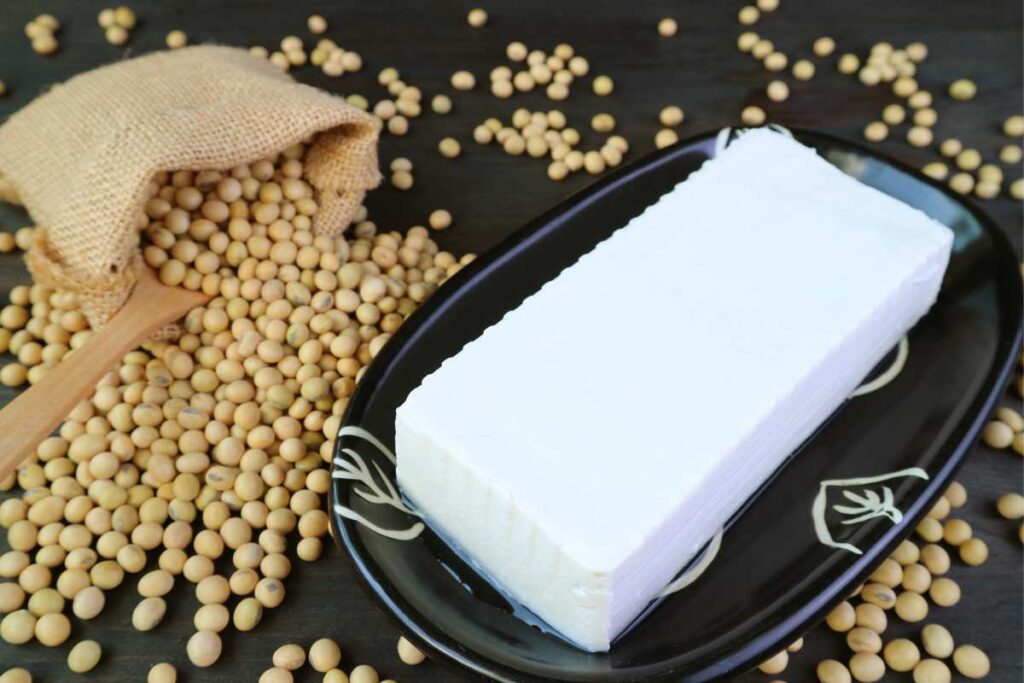
Phytoestrogens for menopause symptoms
During the hormonal transition, your estrogen levels fluctuate and eventually drop. Women+ looking for another approach to relieving symptoms sometimes turn to phytoestrogens.
Phytoestrogens are plant-derived compounds that mimic the action of estrogen in the body and have the potential to ease menopausal symptoms.
Popular phytoestrogens include:
- rhubarb extract
- black cohosh
- soy isoflavones
- flaxseed
- red clover
They may be sold on their own or in combination with other ingredients.
Rhubarb extract
Rhubarb extract is known for its phytoestrogen properties, particularly the rhapsodic rhubarb variant.
The dry extract has been available in Germany to treat menopausal symptoms for over two decades.
It has been studied for its ability to ease symptoms like hot flashes due to its estrogen-like activity. It’s also been found to be effective in reducing perimenopausal anxiety.
Estrovera®
In the United States, Estrovera® is a supplement with a proprietary extract (ERr 731) sourced from rhapontic rhubarb. The supplement also contains other ingredients, and the manufacturer says it can help with symptoms without raising estrogen levels.
It is marketed for the relief of 12 of the most common menopause symptoms, including:
- hot flashes
- night sweats
- sleep disruption
- anxiety
- exhaustion
- irritability
- vaginal dryness
- mood swings
- sexual frustration
- joint and muscle discomfort
- urinary tract discomfort
- headache
The manufacturer reports their 2023 survey showed:
- 95% of survey respondents saw improvements in mood
- 90% of survey respondents reduced their hot flashes
- 71% saw improved sleep
They presented their findings at The Menopause Society’s Annual Meeting.
In its 2023 non-hormonal position statement, The Menopause Society, does not recommend it due to the extremely low retention rate in clinical trials and issues in one of the study designs.
Estroven®
Not to be confused with the product above, Estroven® Complete is marketed for multi-symptom relief. The manufacturer has a number of supplements for energy, mood, sleep, weight management, pre-menopause, and menopause.
The menopause product contains rhapontic rhubarb. It also includes:
- vitamin E
- thiamin riboflavin
- niacin
- vitamin B6
- folate (vitamin B9)
- vitamin B12
- calcium
- selenium
- Estroven Calming Herbal Blend (proprietary blend of Date seed extract [Zizyphus spinosa] and Magnolia bark extract)
- isoflavones (from Pueraria lobata root extract and GMO-free soybeans)
- Black cohosh root standardized extract
- boron
The manufacturer reports up to 90% reduction in hot flashes and night sweats as well as improvement in mood swings, occasional sleeplessness, and low energy levels.
Since the menopausal product contains black cohosh, a popular herb for symptoms, you should be aware of the potential for liver damage with its use. pausitive health’s comprehensive herbal guide provides information on potential side effects and the clinical studies for black cohosh.
Estroven® may also interact with the thyroid medication, levothyroxine.
As always, talk to your healthcare practitioner before taking a supplement to discuss the pros, cons, potential drug interactions and side effects, and whether it would be appropriate in your particular situation.
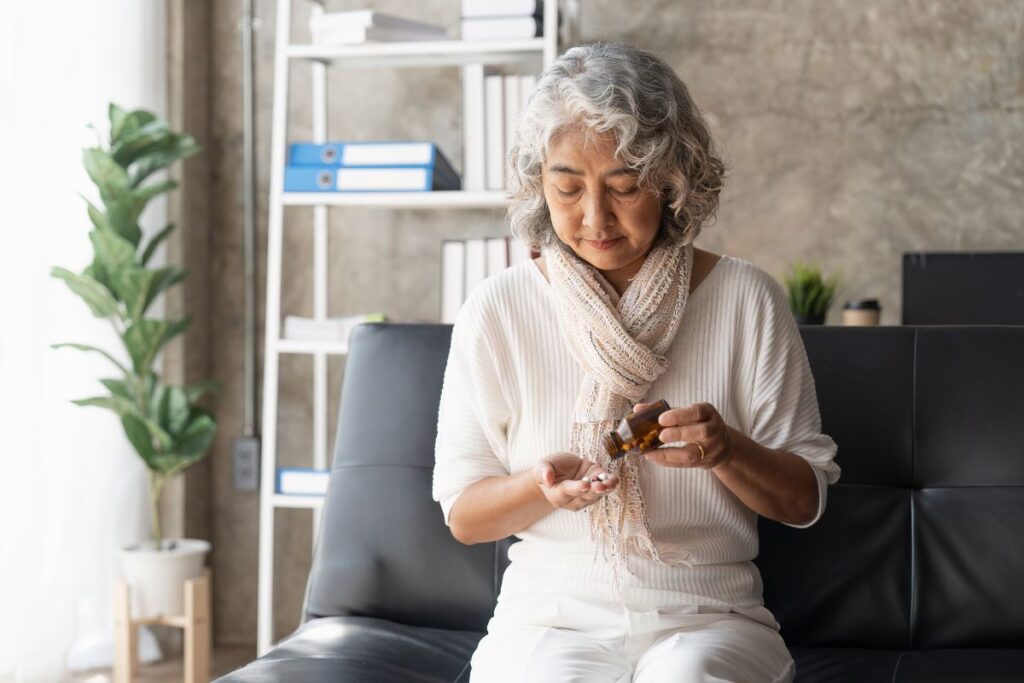
Black cohosh
In addition to some supplement ingredients containing black cohosh, you can also buy just black cohosh.
Black cohosh is a phytoestrogen that has been traditionally used for symptoms of menopause.
While the exact mechanism of action is not fully understood, it is believed to have a serotonergic effect, which may help regulate body temperature and mood.
Research on black cohosh has been mixed, with some studies suggesting a benefit for menopause symptoms, particularly hot flashes, while others have not.
There have been some rare reports of liver damage associated with its use. Women+ with a history of liver disorders, those who are taking medications that affect the liver, or those who consume alcohol regularly are usually told to use black cohosh with caution, or avoid it altogether.
Soy isoflavones
You’ve probably heard about soy’s potential positive benefits for menopause symptoms. It’s often touted as an alternative to hormone therapy (HT) because soy is a staple in the Asian diet, and, often, Asian women who have a regular intake of soy report fewer hot flashes than women from other racial groups.
Soy contains a high concentration of isoflavones phytoestrogens, a type of plant estrogen (phytoestrogen) that is similar in function to human estrogen but has much weaker effects. They have active ingredients such as:
- S-equol
- daidzein
- genistein
Some of these active ingredients are in popular supplements like Equelle®.
A review of dozens of abstracts and articles found isoflavones may:
- reduce hot flashes
- prevent bone loss
- help with systolic blood pressure in early menopause.
Researchers noted it’s hard to draw conclusions due to a lack of standardized research, but given the supplements’ overall safety profile and potential health benefits, the evidence favors their use.
Most side effects are in the GI tract.
The Menopause Society also points out mixed evidence for the use of soy, including wide variations in types of soy supplements and dosages.
Talk with your healthcare practitioner before using soy isoflavones for symptoms.
Femarelle®
Femarelle® also contains phytoestrogens. It has a tofu extract (DT56a proprietary blend from soy), flax seed, and vitamin B6.
There are several Femarelle® products targeting various menopausal symptoms.
It has been reported to be effective against hot flashes. In four weeks of treatment, 80.7% of the Spanish menopausal or perimenopausal women in the study reported their hot flashes were better or much better.
Red clover
Red clover is a type of legume (think peas and beans). It’s often sold as a tea or a pill, and it also has phytoestrogenic properties.
Women use red clover for menopause symptoms like:
- Low bone density (osteopenia and osteoporosis)
- Hair thinning
- Skin changes
- Low libido
- Mood changes
- Sleep issues
- Low energy levels
- Anxiety
- Hot flashes
- Supporting heart health
Red clover may not be safe for those for whom estrogen hormone therapy would not be safe.
Learn more about red clover studies in our pausitive health herbal remedy guide.
Fenugreek seeds
Fenugreek seeds, known for their culinary and medicinal use, may help menopausal symptoms by mimicking estrogen.
In China, women+ use the plant for menopausal symptoms.
In a study of post-menopausal women, fenugreek reduced vasomotor symptoms and leg pain, which is another symptom seen by some on the journey. That study was funded as part of research for the development of a product.
In addition to hot flashes, another study showed fenugreek also helped with depression and insomnia. Depression was helped more than vasomotor symptoms (VSMs – hot flashes, night sweats, and palpitations) in that study.
Fenugreek seeds are also rich in dietary fiber, which can promote digestive health—an aspect often compromised during menopause.
Hops
Hops are also known for their phytoestrogenic properties.
Hops, commonly associated with beer production, contain prenylflavonoids, which may have a mild estrogenic effect. They could potentially be beneficial in alleviating menopausal symptoms such as hot flashes and night sweats.
Studies have also been performed to determine the effectiveness of hops for sleep issues and osteoporosis prevention.
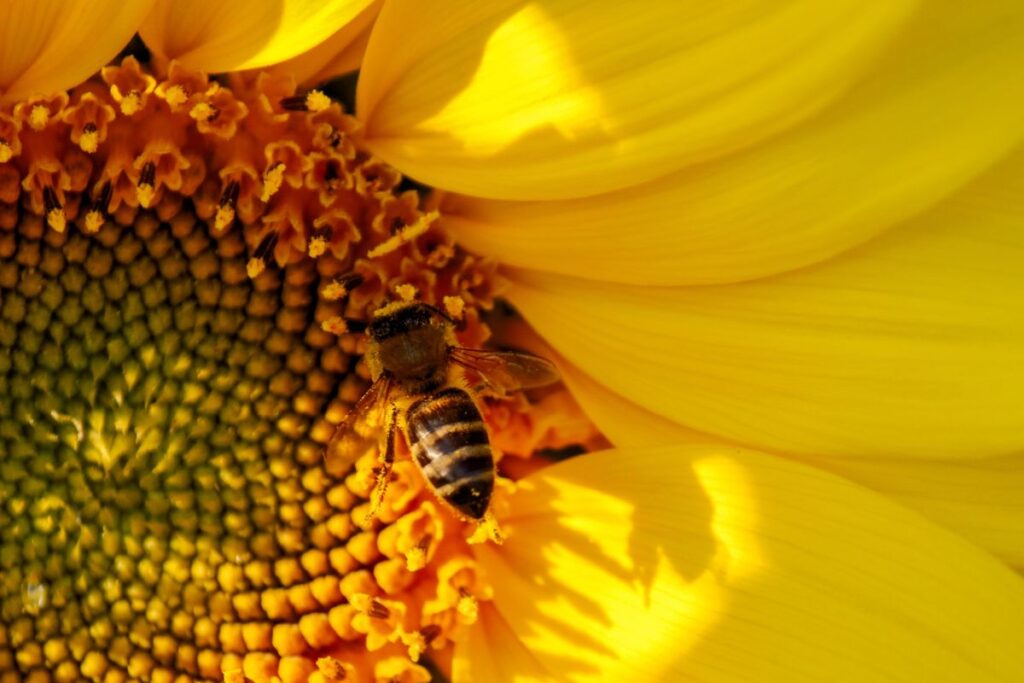
Pollen Extracts
Bee pollen is a holistic remedy praised for its nutrient-rich profile, containing amino acids, vitamins, and minerals. Its use in menopause is less well documented, but it has been observed to have a potential role in boosting energy and improving vitality, and potentially countering the fatigue many women experience during menopause.
In a small study which evaluated the effectiveness of a pollen-honey mixture versus just honey, similar results were observed. Honey was considered the placebo, but 68% of patients experienced improved symptoms, and with the pollen-honey mixture, 70% saw an improvement. So, the results were similar.
There are several products with proprietary extracts of flower pollen including Relizen®, Sérélys®, Femal, and Femalen for women+ experiencing hot flashes and other vasomotor symptoms.
Relizen®
Relizen® is found on supplement websites and marketed for hot flashes and night sweats.
It contains a proprietary blend of four Swedish botanicals, including pollen extract. It contains a Cytoplasmic Blend (proprietary Swedish Flower pollen extract (Sérélys) in the form of Pollen + Pistil Extract PI-82 and Pollen Extract GC-FEM).
There are studies showing the effectiveness of Sérélys and Cytoplasmic pollen.
Cytoplasmic pollen has been found to be effective against vasomotor symptoms (VSMs) like hot flashes as well as insomnia, irritability, depression, and fatigue.
Like other manufacturers, Relizen’s manufacturer presented its survey findings at a 2017 meeting of The Menopause Society, formerly The North American Menopause Society. The survey showed 78% of women saw a reduction in hot flashes and 75% reported they were less intense.
The 2023 non-hormonal position statement of The Menopause Society does not recommend pollen extract based on expert opinions and limited scientific research.
Go deeper into the use of bee pollen as a non-hormonal option for menopausal symptoms in the comprehensive pausitive health non-hormonal 101 guide.
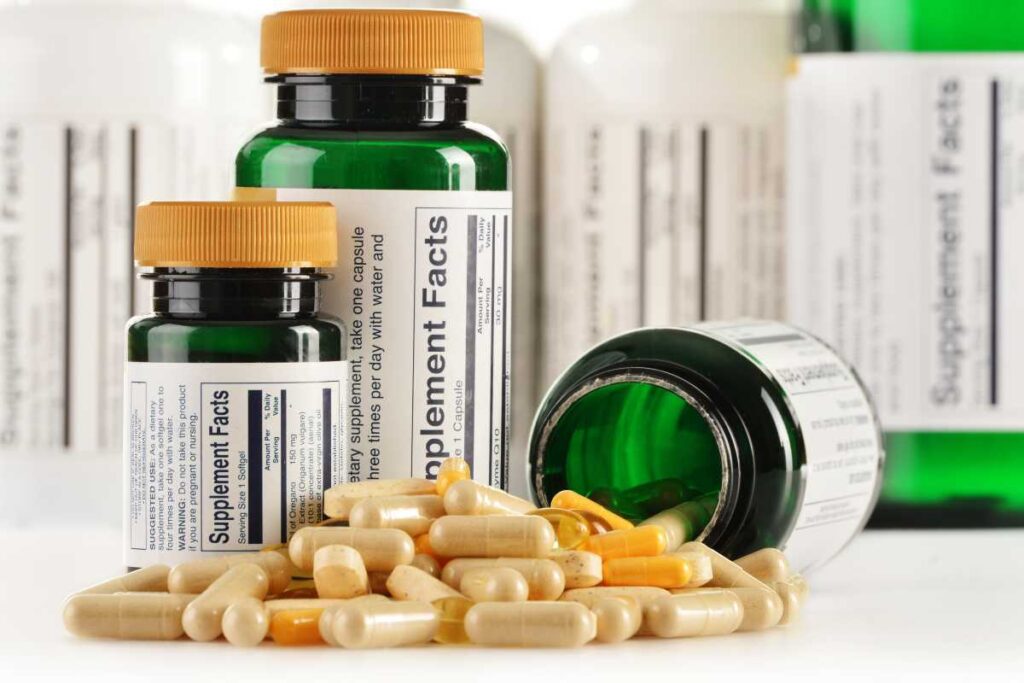
Vitamin supplements during the menopause journey
There are several B vitamins that can help with mood swings during the menopause journey, and vitamin E is used by some women+ to help with hot flashes.
You can take these as a supplement, but a healthy diet can get you where you need to be if you are able to eat enough of the foods rich in the B vitamins.
B-vitamins can help with mood and energy
B-vitamins, particularly B6, B9 (folate), and B12, are essential for energy production and the synthesis of neurotransmitters (chemicals that allow nerve cells to communicate with each other throughout the body) that regulate mood.
Given that menopause can bring about changes in mood and energy levels, maintaining adequate levels of these vitamins is beneficial. Vitamin B6, in particular, has been associated with reducing PMS symptoms, which parallel some symptoms related to your period during perimenopause.
And some studies have shown that those who experience severe PMS symptoms may be at greater risk of early menopause and more severe hot flashes and nights sweats during the menopause journey.
Foods that include vitamin B vitamins include:
- salmon
- leafy greens
- eggs
- milk
- legumes
- sunflower seeds
- nutritional yeast
Want more foods more menopause that are beneficial during the menopause journey? We’ve done some of the homework for you in our grocery shopping list.
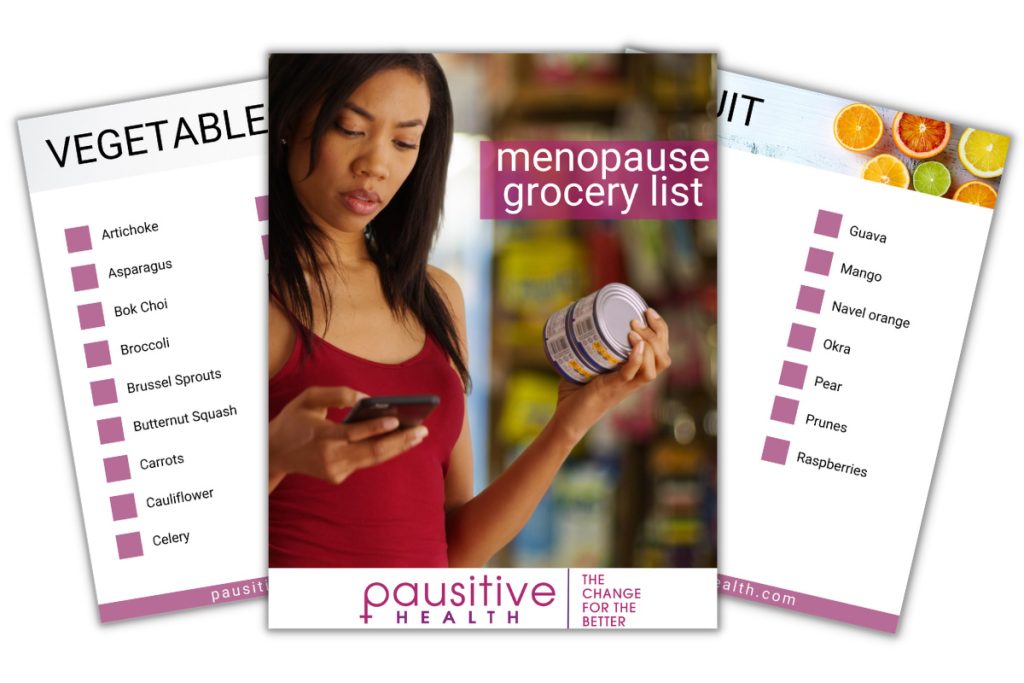
Make A Change For The Better!
This menopause grocery list contains a combination of foods specifically selected to help you feel better today and even better in the future.
"*" indicates required fields
Vitamin E
Vitamin E is often touted for its antioxidant (a substance that may protect cells against free radicals, which may play a role in conditions like heart disease and cancer) properties and has been explored as a remedy for menopausal symptoms, particularly hot flashes.
Some studies suggest that vitamin E may help reduce the severity and frequency of hot flashes, as well as improve symptoms of genitourinary syndrome of menopause (GSM), insomnia, and anxiety.
It’s thought that vitamin E’s antioxidant effect can help manage the oxidative stress (which occurs when antioxidant levels are low) associated with estrogen decline during the menopausal transition.
While research on the effectiveness of vitamin E for menopausal symptoms has yielded mixed results, it remains a popular choice for many seeking relief without using prescription medications.
However, it’s important to take vitamin E supplements cautiously, as high doses can potentially have adverse health effects and may interact with other medications, such as blood thinners.
It’s also worth noting that vitamin E can be obtained from food like nuts, seeds, and green leafy vegetables, which can be a preferable method for some individuals.
Other herbs and botanicals
Dozens of herbs are used by menopausal women to treat symptoms.
If you’re using herbs for symptoms, you may want to talk to an herbalist, naturopathic, integrative, or functional doctor. The potency can vary by product, and the herbs can interact with other medications.
The American Herbalists Guide has a directory to help locate a herbal medicine practitioner. Take note, however, that in the U.S., there are no licensing requirements for herbalists. It’s important to do some research to be sure a practitioner is adequately trained at a reputable school.
Let’s explore some of the more popular herbal supplements.
Chaste Tree Berry (Vitex)
Chaste tree berry, also known as Vitex, has a long history of use in herbal medicine for regulating hormonal imbalances.
It’s particularly noted for its potential to normalize progesterone levels, thereby possibly reducing certain symptoms of menopause, such as irregular cycles and mood fluctuations.
Some research points to its efficacy in relieving premenstrual syndrome (PMS), which shares common features with some perimenopausal symptoms.
Keep reading about vitex in our herbal guide, including menopause benefits and potential side effects.
Evening Primrose Oil
Evening primrose oil is rich in gamma-linolenic acid (GLA), an omega-6 fatty acid.
It’s often touted for its ability to:
- soothe hot flashes
- improve overall skin health, which can become itchy during menopause
While studies have been inconclusive, anecdotal evidence suggests that some women+ find relief from menopausal discomfort upon integrating GLA into their diets.
Wild Yam
Wild yam has long been promoted as a “natural” alternative for hormone therapy in menopausal women, largely due to its content of diosgenin, a chemical compound that can be converted into various steroids in the laboratory, such as estrogen and dehydroepiandrosterone (DHEA). The idea is that these substances may help compensate for the declining levels of estrogen and other hormones during menopause.
Proponents of wild yam supplements claim they can help with a range of menopausal symptoms, including:
- hot flashes
- night sweats
- reduced sex drive
- mood swings
However, it’s important to note that the human body cannot convert diosgenin to hormones like estrogen on its own; this transformation can only be done in a laboratory setting. Therefore, the effectiveness of wild yam as a direct hormonal therapy is not supported by scientific evidence.
Moreover, the use of wild yam extract as a ‘natural progesterone’ is based on the assumption that the body can utilize the diosgenin in wild yam to produce progesterone, which is misleading.
While some wild yam creams are marketed as sources of natural progesterone, they typically must be processed to contain progesterone.
It’s also worth mentioning there is limited scientific research on the effects on menopausal symptoms of wild yam taken by itself, and its safety profile is not fully understood.

Talk to your pharmacist and healthcare practitioner
Many supplements on the market incorporate a mix of different herbs and vitamins. These multi-ingredient supplements are designed to address a range of symptoms, potentially improving their overall efficacy.
Do your research and be aware of each ingredient’s role and the potential interactions (with each other as well as medications you may be taking) when opting for these combined supplement products.
Herbs can have powerful effects on the body, and they may interact with prescription medications, over-the-counter drugs, and even other supplements, sometimes in unexpected ways.
A pharmacist can be a valuable resource because they have specialized knowledge of medication management and can advise on the safety of combining specific herbs with your current medication regimen. They can also inform you about the proper dosages and the best form in which to take a supplement, as well as help you understand any possible side effects or risks.
In addition to speaking with a pharmacist, it’s also crucial to inform your healthcare practitioner about all the OTC medicines, supplements/vitamins, and herbs you’re considering or currently taking. Communication helps to ensure that all your healthcare providers have a complete picture of your health regimen and can more easily provide coordinated care.
Know that supplements are just one non-hormonal way to manage menopausal symptoms. There are also dozens of other non-hormonal options, from yoga to non-hormonal medications for hot flashes and other symptoms.
You have choices! Make a choice to improve your menopause journey.

Lisa Miller, PharmD, BCPS, MSCP
This content was made possible through a collaboration with Dr. Lisa Miller. She is a clinical pharmacist and a North American Menopause-Certified Practitioner with a graduate degree in clinical mental health counseling.
Dr. Miller is the owner of Women's Precision Health, LLC and works with women on mindset, hormones, and their medications, developing individualized plans for a balanced body and mind. Dr. Miller is also the Assistant Dean of the Orlando Campus of the University of Florida College of Pharmacy and a Clinical Professor. In addition to working with midlife women, she also has research interests in women's health and women's mental health.
Home | Amberen
How Amberen works | Amberen
Clinical research | Amberen
How does Equelle work? | Equelle
Sekikawa A, Ihara M, Lopez O, Kakuta C, Lopresti B, Higashiyama A, Aizenstein H, Chang YF, Mathis C, Miyamoto Y, Kuller L, Cui C. Effect of S-equol and Soy Isoflavones on Heart and Brain. Curr Cardiol Rev. 2019;15(2):114-135. doi: 10.2174/1573403X15666181205104717. PMID: 30516108; PMCID: PMC6520578.
Clinical Research | Equelle
Kaszkin-Bettag M, Ventskovskiy BM, Kravchenko A, Rettenberger R, Richardson A, Heger PW, Heger M. The special extract ERr 731 of the roots of Rheum rhaponticum decreases anxiety and improves health state and general well-being in perimenopausal women. Menopause. 2007 Mar-Apr;14(2):270-83. doi: 10.1097/01.gme.0000251932.48426.35. PMID: 17213754.
Estrovera | Metagenics
The Menopause Society (formerly The North American Menopause Society). The 2023 nonhormone therapy position statement. Menopause: The Journal of The North American Menopause Society. Vol. 30, No. 6, pp. 573-590
DOI: 10.1097/GME.0000000000002200
Home | Estroven
Drug Interactions between Estroven and levothyroxine | Drugs.com
Tjeerdsma AM, van Hunsel FPAM, van de Koppel S, Ekhart C, Vitalone A, Woerdenbag HJ. Analysis of Safety Concerns on Herbal Products with Assumed Phytoestrogenic Activity. Pharmaceuticals (Basel). 2023 Aug 10;16(8):1137. doi: 10.3390/ph16081137. PMID: 37631050; PMCID: PMC10459077.
Straight Talk About Soy | The President and Fellows of Harvard College
Home | Femarelle
Sánchez-Borrego R, Mendoza N, Llaneza P. A prospective study of DT56a (Femarelle®) for the treatment of menopause symptoms. Climacteric. 2015;18(6):813-6. doi: 10.3109/13697137.2015.1065247. Epub 2015 Oct 10. PMID: 26455645.
Wu T, Yue R, He M, Xu C. Effect of Fenugreek on vasomotor symptoms in menopausal women: A protocol for systematic review and meta-analysis. Medicine (Baltimore). 2020 Jun 5;99(23):e20526. doi: 10.1097/MD.0000000000020526. PMID: 32502006; PMCID: PMC7306339.
Thomas J, Rao J, John F, Begum S, Maliakel B, IM K, Khanna A. Phytoestrogenic effect of fenugreek seed extract helps in ameliorating the leg pain and vasomotor symptoms in postmenopausal women: A randomized, double-blinded, placebo-controlled study. PharmaNutrition. 2020. Volume 14. https://doi.org/10.1016/j.phanu.2020.100209
Khanna A, John F, Das S, Thomas J, Rao J, Maliakel B, Im K. Efficacy of a novel extract of fenugreek seeds in alleviating vasomotor symptoms and depression in perimenopausal women: A randomized, double-blinded, placebo-controlled study. J Food Biochem. 2020 Dec;44(12):e13507. doi: 10.1111/jfbc.13507. Epub 2020 Oct 6. PMID: 33025616.
Münstedt K, Voss B, Kullmer U, Schneider U, Hübner J. Bee pollen and honey for the alleviation of hot flushes and other menopausal symptoms in breast cancer patients. Mol Clin Oncol. 2015 Jul;3(4):869-874. doi: 10.3892/mco.2015.559. Epub 2015 May 4. PMID: 26171198; PMCID: PMC4486804.
Relizen: Menopausal hot flash relief | Bonafide
Biglia N, Giorgi M, Rosso R, D’Alonzo M, Actis S, Cipullo I, Robba E, Elisabetta Bounous E. Purified and Specific Cytoplasmic Pollen Extract for the treatment of vasomotor menopausal symptoms: a review. Academic Division of Obstetrics and Gynaecology – A.O. Ordine Mauriziano, University of Turin, Turin, Italy. 2022.
Relizen Provides Relief From Hot Flashes | Yahoo
Yang Y, Valdimarsdóttir UA, Manson JE, et al. Premenstrual Disorders, Timing of Menopause, and Severity of Vasomotor Symptoms. JAMA Netw Open. 2023;6(9):e2334545. doi:10.1001/jamanetworkopen.2023.34545
Feduniw S, Korczyńska L, Górski K, Zgliczyńska M, Bączkowska M, Byrczak M, Kociuba J, Ali M, Ciebiera M. The Effect of Vitamin E Supplementation in Postmenopausal Women-A Systematic Review. Nutrients. 2022 Dec 29;15(1):160. doi: 10.3390/nu15010160. PMID: 36615817; PMCID: PMC9824658.
Vitamin E | Mayo Clinic
Registered Herbalists | American Herbalists Guild
Naseri R, Farnia V, Yazdchi K, Alikhani M, Basanj B, Salemi S. Comparison of Vitex agnus-castus Extracts with Placebo in Reducing Menopausal Symptoms: A Randomized Double-Blind Study. Korean J Fam Med. 2019 Nov;40(6):362-367. doi: 10.4082/kjfm.18.0067. Epub 2019 May 9. PMID: 31067851; PMCID: PMC6887765.
You may also like…
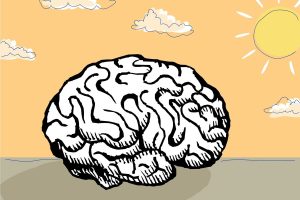
Conquer Menopausal Hot Flashes And Sleeplessness With CBT
Learn about cognitive behavioral therapy or CBT to help manage hot flashes, night sweats, and sleeplessness.
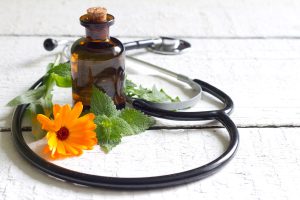
Naturopathic, Integrative, and Functional Medicine: Holistic Health for Menopausal Women Explained
What’s the difference between naturopathic, integrative, functional, and Traditional Chinese Medicine?
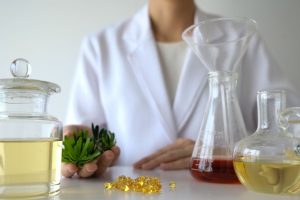
Which Herbal Remedies Offer Relief From Hot Flashes And Other Menopause Symptoms?
Can herbal remedies help menopause symptoms like hot flashes? Get the latest science, risks, and reported health benefits.

